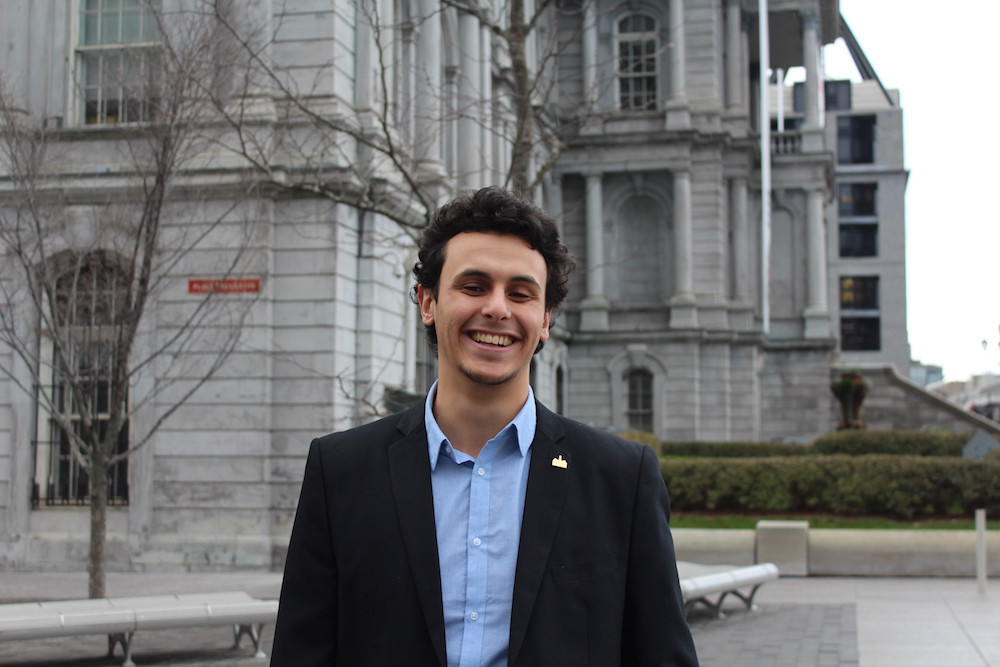Lachine borough councillor Younes Boukala is giving a voice to his district and his generation
Next winter, while Montreal Mayor Valérie Plante makes some important political announcement, Lachine borough councillor Younes Boukala might be in class at the Université du Québec à Montréal. This is the reality of being the city’s youngest municipal politician.
At 22, Boukala is taking over the leadership of Lachine’s J.-Émery-Provost district, one of the borough’s most impoverished areas, under the banner of Projet Montréal. It’s a sector he knows all too well—he still lives there with his parents in cooperative housing.
I first spoke to Boukala in August, at the start of his campaign. He had just finished his mandate as youth ambassador of Lachine—one of Montreal’s 19 boroughs—for the city’s 375th anniversary.
The purpose of the project, organized by the Forum jeunesse de l’île de Montréal (FJIM), was for young Montrealers “to raise awareness about the reality of young people in their borough, to mobilize and consult with other young people in the borough,” according to the forum’s website.
During a trip to China with Boukala and other youth ambassadors last spring, FJIM president Jennifer Teasdale-Raymond spoke to Boukala about the possibility of running in the November municipal election.
“You need to be a bit audacious,” Boukala said in August about running for election. This is particularly true in the J.-Émery-Provost district, where high school graduation rates are low— just like voter turnout. Boukala admitted his parents had never voted in municipal elections before he announced his candidacy.
According to data collected by Le Devoir, at least three of the polling stations in the J.-Émery-Provost district had a voter turnout rate of less than 25 per cent in 2017.
During this campaign, Boukala discovered his area was home to two very distinct groups of people: those who have lived in Lachine their whole lives, and immigrant families who just arrived in Montreal. Despite their differences, Boukala said the two groups were united in their cynicism towards politics.
Boukala thought he represented both groups. He was born in Morocco but moved to Montreal when he was just one year old. “I saw what was necessary for families to integrate [into a new community] through the experience of my parents.”
“At the same time, I lived with native Quebecers and went through the Quebec education system,” he explained, “so I had the right profile.” Boukala said he considered himself “the middle ground” that could unite the multicultural and native Quebec communities in his district.
The young candidate had difficult moments throughout his campaign, but he told himself “it was part of life and that nothing was easy.” His laid-back attitude was apparent during our conversation. “I’m someone who enjoys life,” he said.
The week and a half following the election, before being sworn in, was when Boukala finally relaxed. He was tired, understandably. From late August to the start of September, he went door-to-door to campaign every day for at least four hours. On sunny days, he would leave his house at 10 a.m., campaign for eight hours and return home at 6 p.m. to eat.
“Doing eight hours of canvassing was something,” Boukala said, admitting that campaigning can be tough on morale. “It’s not easy when someone shuts the door on you, and then the neighbour is a Projet Montréal supporter,” he said. “You’ve got to find a balance.”
Getting young people interested in politics
One of Boukala’s objectives has always been to make municipal politics interesting to the younger generation. “Listen, we’re not only there to study and work in fields we don’t like,” he said about young people. “You don’t need a doctorate to be a candidate. You only need to be on the field, in your district.”
Retired people were surprised when he spoke to them during his campaign, Boukala remembered with a laugh. “Well then, how did this happen?” he remembered people asking, surprised by his age.
Throughout his time in college and university, Boukala said he never had one specific goal. “I lived and grabbed hold of opportunities as I went along,” he said.
Now he has the opportunity to make a change as a councillor.
“Councillors can be pawns or trailblazers,” Boukala said. “I want to walk in my neighborhood and think ‘I’m happy I did this. I improved the life of my fellow citizens.’”
Last Thursday, on Nov. 16, Boukala was officially sworn into office. Eleven days prior, Teasdale-Raymond surprised Boukala at the Corona Theatre where Projet Montréal gathered on election night.
“He wasn’t expecting [the result],” Teasdale-Raymond said. Running for election was a challenge, Boukala admitted, “but if you never challenge yourself, you never go forward.”
Photo by Alex Hutchins




